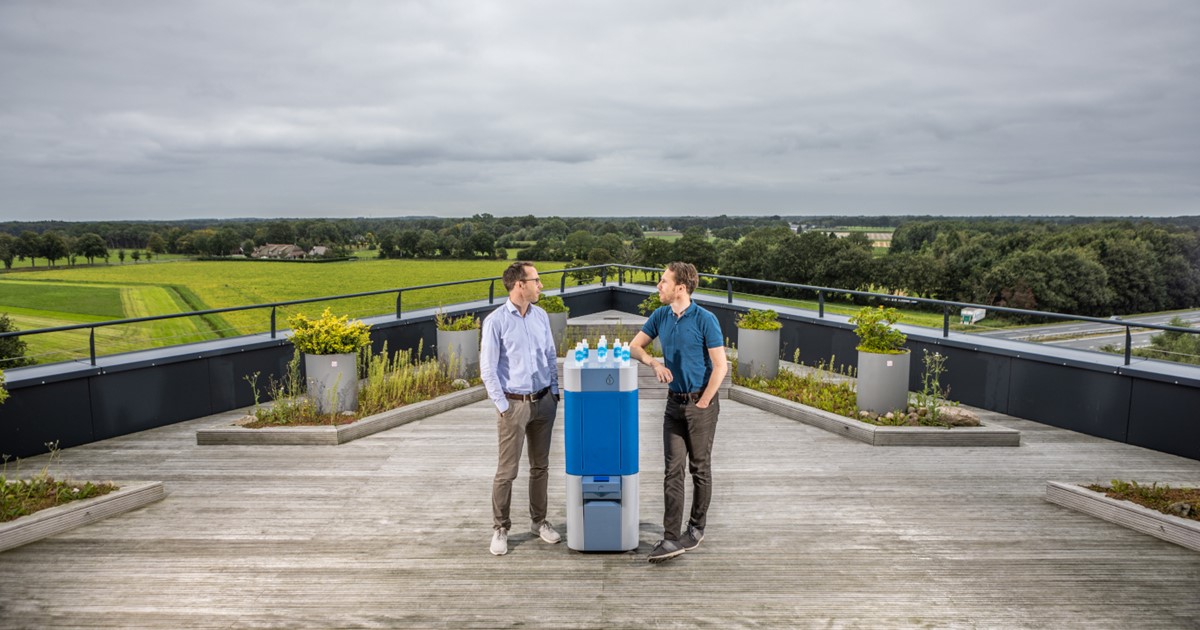The article below is from the glossy NACORONA, an initiative of the four largest northern municipalities and VNO-NCW-MKB Noord.
Watter noticed quite early in 2020 that something peculiar was going to happen to the world. The innovative company of Alfred and Arjan Koop situated in the town of Assen already has done business with Asia for decades and noticed that certain products were not able to be delivered. In China, a new virus that no one had heard of broke out. Since Watter specialized in the production of sustainable disinfection, the advice was: 'all hands on deck!'
Healthcare institutes can save a significant of money, by producing the disinfectant themselves

The Netherlands has been confronted with outbreaks before, such as that swine fever and bird flu. "We have also had virus-related outbreaks before, such as the SARS, MERS, and NORO viruses," says Alfred Koop, who founded the company Watter in 2008 together with his twin brother Arjan. "Suddenly, in the early 2020s, several relations came to us, needing additional disinfectant quickly, due to the COVID-19 outbreak."
Effective and sustainable
After years of research, Watter developed a machine that allows you to produce a sustainable disinfectant indefinitely, based on only water, salt and electricity. "Our disinfectant has hypochlorous acid (HOCl) as its main active ingredient. This is 100 times more effective than bleach, for example. It is a sustainable alternative to toxic agents such as alcohol," explains Alfred. Our product has been independently tested and is effective against bacteria, yeasts, fungi and viruses. In addition, it does not have a negative impact on your hands like, for example, alcohol."
Restrictive regulations
"In 2020, we started to produce our disinfectant in bottles because there was a great shortage. Although the reactions from the market were lyrical, we soon ran into restrictive regulations in the Netherlands where the assessment takes more than two years, while a pandemic is going on. Imagine: our product was allowed to be produced and used on site, but we were not allowed to market it in bottles in the Netherlands. The strange thing is that it can be used in surrounding countries. Strange, isn't it?"
Disinfection as a Service
The brothers therefore came up with DaaS: Disinfection as a Service. Alfred: "We install one of our devices at our clients' premises and they pay a fixed monthly fee for it. It's the same principle as Software as a Service (SaaS), as we know it in ICT. Our customers can now produce unlimited amounts of disinfectant themselves, at a very competitive price. One is no longer dependent on suppliers and has no more packaging, transport or storage costs." Watter's innovative solution also has a number of sustainable advantages. For example, less plastic is used, there are fewer CO2 emissions and less administration.
Fast, innovative actions
"Now that the European Union has officially approved our active ingredient in February 2021, we look to the future with even more confidence. We have noticed how conservative the health sector actually is and how reluctant people are to react to new developments, while the pandemic actually calls for rapid and innovative actions. Together with Health Hub Roden, we are now working on more information and knowledge sharing."
Self-reliant
"I hope that we, as a society, learn from the pandemic so that we can tackle it better and faster in the future and not allow so much cross-contamination to occur again. Watter wants to play an important role in this. We contribute to the reduction of infections and contagions and to the improvement of health. As far as we are concerned, every healthcare institution will become self-reliant in the future, by producing its own disinfectant, at a fraction of today's costs."
Want to view the full glossy?
View the glossy online at Issuu: https://issuu.com/ronoverbeek/docs/nacorona_glossy_2021.
For more information on the NACORONA glossy, visit the VNO-NCW-MKB Noord website: https://vnoncw-mkbnoord.nl/glossy
Photo credits: Ronnie Zeemering



